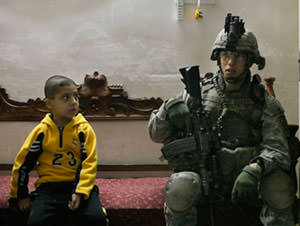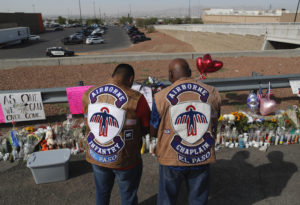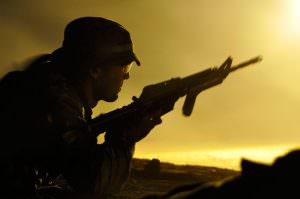Trading Spaces, Iraq Edition
Sectarian violence has driven millions of Iraqis from their homes. Now that the violence has abated in one formerly upscale Baghdad neighborhood, residents are returning to find squatters who refuse to leave and a government and occupying army unwilling to kick them out.
BAGHDAD — American troops scour Baghdad’s southwestern neighborhood of Saidiyah for sectarian fighters and roadside bombs, fund reconstruction projects, hand out backpacks to schoolchildren and distribute grants to businesses that want to reopen now that sectarian violence in the area has abated.
But there is one important thing the Americans won’t do in Saidiyah, and this causes significant contention between the soldiers and the neighborhood’s community leaders: They will not evict hundreds of families that have illegally moved into houses abandoned when thousands of local residents fled to escape the block-by-block battles between Sunni and Shiite militias last year.
Evicting the squatters would allow the houses’ rightful owners to return from self-imposed exile to the once-upscale neighborhood of rich merchants and former Baath Party officials, say members of Saidiyah’s neighborhood council. Lawyers and doctors would reopen their practices, merchants would reopen their shops, and Saidiyah would prosper again.
But the Americans say that forcing out the squatters would cause a new cycle of displacement and homelessness, causing resentment and discontent among newly displaced families. They refer to an Iraqi government policy the Ministry of Displacement and Migration adopted this year, which prohibits local authorities from evicting displaced Iraqis, even if they are residing in homes unlawfully — and even if it means that the rightful owners must be turned away.
One thing both Americans and Saidiyah neighborhood officials agree on: Regardless of how it is solved, the issue of real estate ownership will cast a pall over the effort to bring reconciliation and prosperity to this part of Baghdad.
The problem of squatters in Saidiyah highlights a crucial challenge the rest of Iraq faces as it begins the process of reconciliation and recovery from sectarian strife that peaked here last year, killing thousands of people. More than 4 million Iraqis fled or were forced out of their homes, according to the United Nations, and more than 2.5 million of those moved to different areas inside Iraq. Tens of thousands settled illegally in homes that do not belong to them.
“There really won’t be a happy solution to resettlement, at least not in the near future,” said U.S. Army 2nd Lt. Chris Allen, whose Apache Company of the 4-64th Combined Arms Battalion, 3rd Brigade Combat Team, 3rd Infantry Division, assists Saidiyah’s neighborhood officials with the resettlement of returning residents.
Up to 400 families have returned to Saidiyah since February, says Lt. Col. Johnnie Johnson, the 4-64th commander. Ali al-Ameri, chairman of the neighborhood council, says that approximately 310 families that had come to Saidiyah to escape the violence in their areas of Iraq left and went home during the same period.
But hundreds of people still occupy houses that belong to someone else, and many refuse to move — even when the owners return, Ameri said.
“Last week more than 20 families came to me and said that they couldn’t move back because someone else was living in their house,” said Ameri. He cast a glowering glance in the direction of an American officer, Capt. Andrew Betson, who has repeatedly denied Ameri’s requests to force out the squatters. ” … I had to tell them that there was nothing I could do to help them.”
Faras al-Qabi, another council member, said: “We talk about this with coalition forces and they say don’t kick them out, they are displaced. But I met a guy who just came back. He said he has lived in a house for 30 years. He had a deed to his house, birth certificates of his children that said they were born in that house. But someone else is living in it. Is that fair?”
“It is an issue of compassion,” Betson responded. “Everybody cares but no one wants to put families out in the streets. It’s hard. It’s frustrating. The answer is not going to come from the coalition forces.”
Betson said it is the Iraqi government’s job to resolve the issue, but the nation’s resettlement policy is vague on how to handle such disputes. It states, for example, that the displaced families “have the right to get back their residence or land or belongings that they were forced to leave, or to get compensation for the lands or homes or belongings that are hard to get back.”
If this means that people who find their houses occupied by squatters are entitled to a new house, that means the government would have to spend millions of dollars on compensation, which it cannot afford to do, Lt. Col. Johnson said. An average house in Saidiyah costs about $100,000.
Johnson said he had not heard of any family in the Rashid district of Baghdad, which includes Saidiyah, that had been compensated for losing a home to squatters.
“The only compensation I’ve heard of” was a one-time payment of about $900 to each of the families that returned to Saidiyah earlier this year, Johnson said. He wouldn’t venture a guess as to how many people were squatting in Saidiyah, but Ameri said they number in the hundreds.
When Americans patrol the neighborhood, they can identify owners if they produce the deeds to their homes. But many people here tell Americans they are renting the houses, and in a land where most rental agreements are verbal, their claims are difficult to verify, the soldiers say.
Betson understands the complexity and importance of the property issue and dispatches his soldiers on daily patrols to try to find out how many people in Saidiyah’s litter-strewn streets own their houses. But when the soldiers identify squatters, they will do nothing to move them out, he says.
He expects the problem to worsen in the summer, when the school year ends. Hundreds of refugees whose children are attending school in Syria, Lebanon and Jordan may be planning to return to Saidiyah at that time.
“There is no easy solution,” Betson said. “It’s definitely not the fault of Iraqi government or the fault of American army. It’s really just hard.”
Your support matters…Independent journalism is under threat and overshadowed by heavily funded mainstream media.
You can help level the playing field. Become a member.
Your tax-deductible contribution keeps us digging beneath the headlines to give you thought-provoking, investigative reporting and analysis that unearths what's really happening- without compromise.
Give today to support our courageous, independent journalists.








You need to be a supporter to comment.
There are currently no responses to this article.
Be the first to respond.